

Stratagies. Yara International. Growing Africa's Agriculture. International Food Policy Research Institute (IFPRI) El Nino's threat to major food crop yields. 15 May 2014Last updated at 09:23 ET By Mark Kinver Environment reporter, BBC News Responding to the impacts of El Nino could help maintain crop yields, the study suggests El Nino events can have a significant impact on the yields of certain major food crops, a study has shown.
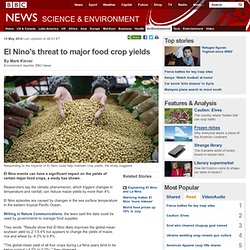
Researchers say the climatic phenomenon, which triggers changes in temperature and rainfall, can reduce maize yields by more than 4%. El Nino episodes are caused by changes in the sea surface temperature in the eastern tropical Pacific Ocean. Addressing the common need for food, feed, fibre and fuel requires a global action plan to increase agricultural output in an environmentally-sustainable, economically-feasible, socially-responsible manner. CIAT - International Center for Tropical Agriculture. CGIAR. Reports. Reports Achieving Food Security in the Face of Climate Change The Commission on Sustainable Agriculture and Climate Change has reviewed the scientific evidence to identify a pathway to achieving food security in the context of climate change.
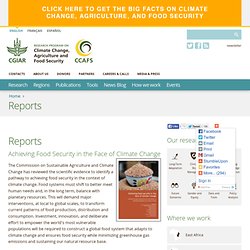
Food systems must shift to better meet human needs and, in the long term, balance with planetary resources. This will demand major interventions, at local to global scales, to transform current patterns of food production, distribution and consumption. Investment, innovation, and deliberate effort to empower the world's most vulnerable populations will be required to construct a global food system that adapts to climate change and ensures food security while minimizing greenhouse gas emissions and sustaining our natural resource base. Final Report (March 2012) Final Report from the Commission on Sustainable Agriculture and Climate Change (4.5 MB PDF) Summary for Policy Makers (November 2011) English Francais Espanol Português Background Studies. Food Security - Big Facts.
Big Facts is a resource of the most up-to-date and robust facts relevant to the nexus of climate change, agriculture and food security.
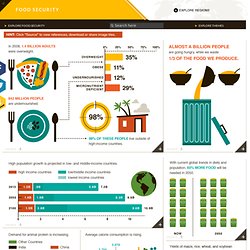
It is intended to provide a credible and reliable platform for fact checking amid the range of claims that appear in reports, advocacy materials and other sources. Full sources are supplied for all facts and figures and all content has gone through a process of peer review. Big Facts is also an open-access resource. We encourage everyone to download, use and share the facts and graphic images. Home - Global Food Security. Peak soil: industrial civilisation is on the verge of eating itself.
A new report says that the world will need to more than double food production over the next 40 years to feed an expanding global population.
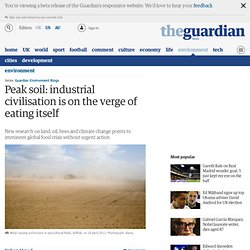
But as the world's food needs are rapidly increasing, the planet's capacity to produce food confronts increasing constraints from overlapping crises that, if left unchecked, could lead to billions facing hunger. The UN projects that global population will grow from today's 7 billion to 9.3 billion by mid-century. According to the report released last week by the World Resources Institute (WRI), "available worldwide food calories will need to increase by about 60 percent from 2006 levels" to ensure an adequate diet for this larger population.
Desertification - a threat to the Sahel. Written: August 1994 For reference: Eden Foundation, Sweden (1994:1) Land covers 14.9 billion hectares of the earth's surface.

A UNEP (United Nations Environmental Programme) study shows that 6.1 billion hectares are dryland of which 1 billion hectares are naturally hyperarid desert. The rest of the dryland has either become desert or is being threatened by desertification. One quarter of the world's population inhabit the drylands and depend on this area for their livelihood. The desert itself is a somewhat stable environment. 80% of Tropical Deforestation Caused by Agriculture.
Glenn Hurowitz/CC BY-ND 2.0 A new report on what are the leading causes of deforestation and forest degradation across Africa, Latin America, and Asia finds that agriculture, both commercial and local/subsistence, is responsible for 80% of tropical deforestation.
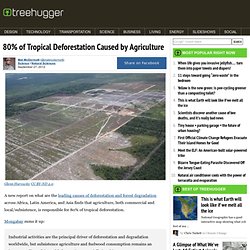
Forest conversion: agriculture and plantations. Conversion of forests – from South America's tropical forests to Russia’s temperate forests – to meet worldwide demand for consumer products is leading to deforestation and a range of ecological and social impacts.
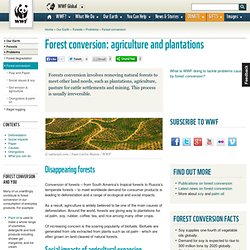
As a result, agriculture is widely believed to be one of the main causes of deforestation. Around the world, forests are giving way to plantations for oil palm, soy, rubber, coffee, tea, and rice among many other crops. Po_factsheet.pdf. Hunger Statistics, Hunger Facts & Poverty Facts. Although related, food insecurity and poverty are not the same.
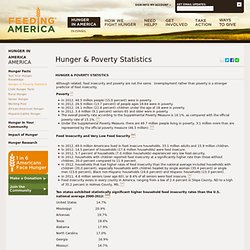
Unemployment rather than poverty is a stronger predictor of food insecurity. Poverty [i] In 2012, 46.5 million people (15.0 percent) were in poverty. In 2012, 26.5 million (13.7 percent) of people ages 18-64 were in poverty. In 2012, 16.1 million (21.8 percent) children under the age of 18 were in poverty. _Agriculture_and_Food_Security. Famine Early Warning Systems Network (FEWS NET)
Food Security. Food security. Global development. A weighty problem: how to halt obesity in the developing world. A six-year-old girl stands on a weighing scale which shows her at about 90kg, or 14 stones, in Matiala, West Bengal, India.
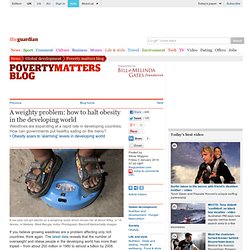
Photograph: Barcroft Media/Getty Images If you believe growing waistlines are a problem affecting only rich countries, think again. Global food waste campaigns suffer from data deficiency. Food waste is an issue of global significance, affecting food security and environmental sustainability, yet basic information is lacking on the types and quantities wasted.
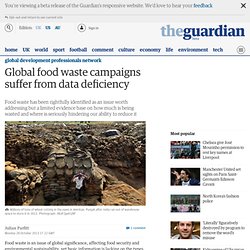
The available statistics give the illusion of information, but are based on very limited data. Much has been written about global food insecurity since the food price rises of 2008. In September the United Nations Conference on Trade and Development (Unctad) waded into the debate with the publication of its trade and environment review 2013. The title "Wake up before it is too late" sets the tone, imploring a greater sense of urgency in bringing about the 'ecological intensification' of global agriculture using approaches fundamentally different to those of the green revolution.